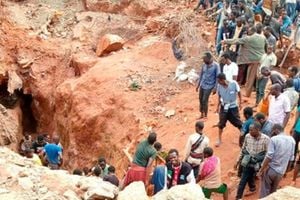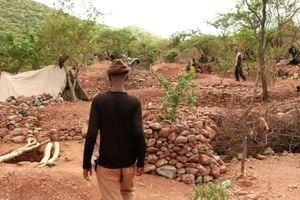
Mr Mohammed Roba mourns at the grave of his son, Edin Mohammed, 21, in Godthe village, Moyale sub-County, on December 16. Edin died on December 9, 2024, in Hillo when gold mines collapsed.
On December 11, Inspector-General of Police Douglas Kanja made an impromptu visit to Moyale sub-County following reports that five miners had died in collapsed illegal gold mines in Hillo, Dabel, Marsabit County.
The sites had been closed earlier in March after 13 people were killed in clashes between two communities that were fighting over the sharing of mineral resources. The government deployed heavy security to ensure no miners accessed the area.
It, therefore, came as a shock that miners were still carrying out their activities undeterred at the site that is supposed to be under round-the-clock police guard.
Since the closure, several incidences of collapsed mines have been reported. For instance, on May 24, three people died after they were buried alive.
On July 19, a police officer was among those killed when enraged miners stormed the heavily guarded goldmines.
Marsabit County Commissioner James Kamu confirmed that a police officer and a civilian lost their lives while another officer sustained serious injuries when a mob engaged police officers manning the goldfields in a fight.
“An angry mob attacked our officers at the closed Hillo goldfields. One officer was killed and another was seriously injured. One civilian also lost his life and the mob stole two rifles belonging to the officers,” Mr Kamau said.
Since 2022, the gold rush at Hillo has attracted miners from other counties such as Migori, Kisumu, Siaya and Homa Bay, besides the locals, before its closure.
Reports indicate that 80 per cent of miners were from Ethiopia, Somalia, Tanzania, Uganda, and the Democratic Republic of Congo.
After the fatal incident on December 9, police chief Mr Kanja issued a statement saying not a single death had been reported at the mines. This left relatives who had just buried their loved ones, leaders and residents in shock. He reiterated that having personally visited the site he could confirm that no life was lost.
Security agencies
“After holding discussions with elders and security agencies, it was established that there were no reports of deaths or missing persons at the Hillo mines,” Mr Kanja stated.
The incident occurred at a time when the government was backfilling the pits and streamlining mining operations in readiness for official reopening planned for early next year.
Residents and leaders in Moyale accused authorities of a cover-up.
The Nation.Africa set out on a fact-finding mission to establish the truth. We drove for about 50 kilometres from Moyale town to Godhe village in search of bereaved families.
Interviews with relatives of the deceased revealed that at least five people died, while five others were injured and were admitted to Moyale Sub-County Hospital for treatment.
The Nation.Africa saw fresh graves of three people, whom relatives said died when the mines collapsed in the wee hours of December 9.
Locals said the two other people who died were Ethiopians whose bodies were hurriedly ferried to their country for burial.
At Godhe, we met women gathered at Mzee Mohammed Roba’s home in a sombre mood as they struggled to come to terms with the loss of two promising lives cut short by the collapsed mines.
They led us to a graveyard about 4km away where the two young men were buried.
Beneath the mounds of soil lay the bodies of Edin Mohammed, 21 and his friend who we could not immediately be identified since his relatives were not available. The two were laid to rest on December 9 in line with Muslim burial rites.
Edin’s father, Mr Roba recounted how his son travelled for over 100km to the mining site. He said each illegal miner was allowed to gain entry into the mine by bribing officers with Sh2,000.
“The officers don’t care whether those who enter come out alive or if they die,” he said.
When Mzee Roba got wind of reports that a mine had collapsed, he rushed to Hillo to confirm whether his son was among the fatalities since his phone was switched off.
On arrival, he was informed that Edin was dead. Mr Roba later found out that his son’s body had hurriedly been ferried by some villagers to his home. He returned home for the burial, and on inquiring further on the matter, he was informed that some elders had colluded with police officers to cover up the matter.
“That is how the IG was cheated that nobody had died in the incident,” Mr Roba said.
Abdo Roba, Edin’s brother, fought back tears during the interview by the graveside. Abdo said that he felt betrayed by the government that ought to have ensured security of the residents by sealing off the sites.
At Alo Bula, a village just about 30km from Moyale town, we meet another bereaved family.
Adan Hassan Katelo is struggling to come to terms with the death of his 16-year-old brother, Ibrahim Hassan Katelo, a former boda boda rider in Moyale town.
After a short stint in the boda boda business, the young man decided to try his luck in the lucrative gold mining trade in the hope of making a financial breakthrough.
“It was his first time to go to the mines. That is the same day that the pits collapsed, and this is how my brother met his death,” Adan said.
Ola Bula village elder Ibrahim Dub Isacko said despite the closure of the sites, mining activities continued at night under the watch of police officers whom he said benefitted massively from such underhand deals.
“Several unreported deaths occur but are subdued by security apparatus in the fear that breaking of such news to the public could have a serious backlash on the community as well as on the security officers involved,” Mr Isacko said.
On December 16, Marsabit Governor Mohamud Ali held a meeting with leaders of six ethnic communities and peace committees in Moyale Sub-County, where he gave an update on the preparations for the planned reopening of the mines.
Mr Ali was, however, incensed by IG Kanja’s statement about the deaths, saying that illegal mining activities were aided by rogue police officers. He said since the closure, over 10 tragic incidents had occurred.
“We did not understand why the Inspector-General of Police, who is one of the key advisers of the President on security matters, could tell a blatant lie without caring about the families which lost their loved ones,” the governor said.
Similar sentiments were echoed by Hillo MCA Edin Adhi who called for the unmasking of rogue officers who turned a blind eye and allowed the security breach.
“The IG should admit he was misled into telling a shameful lie about the deaths of citizens, and apologise to the families who lost their loved ones and to Kenyans,” he said.
Contacted for a comment yesterday Eastern Regional Police Commander Charles Naibei maintained that the police had not received any information regarding the deaths.
“I went there with the Inspector-General of Police and locals told us nobody died. That is a gazetted area and nobody is supposed to access it. If officers on the ground don’t report to us that deaths occurred, we assume it did not happen. If indeed illegal miners died, the residents did not reveal to us perhaps because they feared the repercussions,” Mr Naibei told Nation.Africa in a telephone interview.
Miners pay Sh2,000 bribe
Asked about the graves seen by Nation.Africa, Mr Naibei said: “Before a body is buried there are procedures such as the postmortem to ascertain the cause of death and burial permits. Were these followed so that the cause of death is established?”
“Those whose relatives died should also come out and make a complaint so that we can carry out investigations to establish the truth. Also note that over 80 per cent of illegal miners are from Ethiopia,” Mr Naibei.
However, he said that the police had been informed of the deaths that occurred in July.
But even as the police deny that people sneak into the mines and lives are lost when the pits collapse, residents of Hillo said the deaths will continue because the officers guarding the site are compromised.
So how do illegal miners access the restricted mining sites?
Investigations have revealed that security officers collude with the miners and allow them into the mines. Residents we interviewed said by parting with between Sh2,000 and Sh5,000, the miners are allowed to enter the pits and scoop ore which they pack into bags.
“It depends on how long you want to mine. Lately, the fee has been ranging from Sh2,000 to hundreds of thousands. Those who cough huge amounts are allowed to mine for as long as two weeks,” said a source who sought anonymity due to the sensitivity of the matter.











